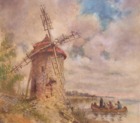| We all have stories to tell, stories we have lived from the inside out. We give our experiences an order. We organize the memories of our lives into stories.
Oral history listens to these stories. Oral history is the systematic collection of living people's testimony about their own experiences. Historians have finally recognized that the everyday memories of everyday people, not just the rich and famous, have historical importance. If we do not collect and preserve those memories, those stories, then one day they will disappear forever.
Your stories and the stories of the people around you are unique, valuable treasures for your family and your community. You and your family members can preserve unwritten family history using oral history techniques. Likewise you and your community can discover and preserve unwritten history large and small. Oral history is so flexible that people of all ages can adapt the techniques of asking and listening to create and learn about history and historical narratives.
As a door into the world of oral history, these pages give basic suggestions for collecting and preserving the valuable oral treasures around you, to enrich you and future generations.
Many people become concerned about "doing it right," yet they also recognize that a voice on tape is better than nothing at all. So try just a simple interview, just talking to someone for an hour. Ten years later such people are thankful that they made the effort.
In oral history projects, an interviewee recalls an event for an interviewer who records the recollections and creates a historical record.
event -> interviewee -> interviewer -> historical record
Please remember to give the Grosse Pointe Historical Society a copy to store archivally for future generations.
|



